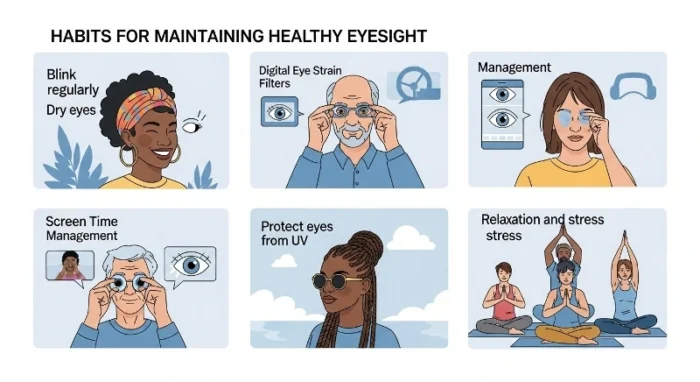Good eyesight is one of the most precious gifts we have. The ability to see the world clearly and enjoy all the beauty around us is something we often take for granted until it begins to deteriorate. However, taking steps to preserve and improve your eye health is easier than you might think. By adopting healthy habits, you can protect your vision for many years to come.

In this post, we’ll explore 10 simple habits that you can incorporate into your daily routine to help maintain healthy eyesight.
Table of Contents
1. Eat a Vision-Boosting Diet
What you eat plays a significant role in maintaining healthy eyes. Certain nutrients have been shown to promote eye health and can help prevent or slow down age-related eye diseases like macular degeneration and cataracts.
Why It Works:
The key nutrients for eye health include vitamins A, C, and E, along with omega-3 fatty acids, lutein, and zeaxanthin. These antioxidants help protect the eyes from oxidative stress, reduce inflammation, and improve overall vision.
How to Implement:
Include foods like carrots, spinach, kale, and sweet potatoes, which are rich in beta-carotene, a type of vitamin A that promotes good vision. Incorporate vitamin C-rich foods such as citrus fruits, berries, and bell peppers to support the health of blood vessels in the eyes. Omega-3 fatty acids, found in fish like salmon, tuna, and mackerel, help protect against dry eyes and reduce the risk of macular degeneration. Green leafy vegetables like kale and spinach are also packed with lutein and zeaxanthin, which filter harmful blue light and protect the retina.
2. Follow the 20-20-20 Rule
In today’s digital age, many of us spend long hours staring at screens, whether it’s a computer, smartphone, or television. This prolonged screen time can cause eye strain, leading to discomfort and fatigue. The 20-20-20 rule is a simple but effective way to reduce eye strain and maintain good eye health.
Why It Works:
The 20-20-20 rule helps give your eyes a break from focusing on a screen for extended periods. It reduces the risk of digital eye strain, which can cause symptoms like dryness, irritation, blurred vision, and headaches.
How to Implement:
Every 20 minutes, look away from your screen and focus on something 20 feet away for at least 20 seconds. This gives your eyes the chance to relax and refocus, preventing strain and improving overall eye comfort. You can set a timer on your phone or computer to remind you to take these breaks regularly.
3. Wear Sunglasses to Protect from UV Rays
While sunlight is essential for our overall health, exposure to ultraviolet (UV) rays can cause serious harm to your eyes. Prolonged exposure to UV rays has been linked to the development of cataracts, macular degeneration, and other eye problems.
Why It Works:
UV rays can damage the sensitive tissues of the eyes and increase the risk of developing various eye conditions. Wearing sunglasses that block out 100% of UV rays helps prevent this damage and protects your eyesight.
How to Implement:
When spending time outdoors, especially on sunny days, always wear sunglasses that offer 100% UV protection. Look for sunglasses that block both UVA and UVB rays. Polarized lenses are also a great option as they reduce glare, making it easier to see in bright conditions. Even on cloudy days, UV rays can still reach your eyes, so make it a habit to wear sunglasses whenever you’re outside.
4. Get Regular Eye Exams
Regular eye exams are essential for maintaining healthy eyesight. Even if you don’t experience any vision problems, visiting an eye doctor at least once every two years can help detect potential issues early on. Many serious eye conditions, such as glaucoma and diabetic retinopathy, often don’t show symptoms until they’ve progressed significantly. Early detection is key to preventing long-term damage.
Why It Works:
Eye exams can identify problems before they become severe, allowing for early treatment and better management of eye health. Regular check-ups also help detect underlying health conditions, such as diabetes and high blood pressure, which can affect vision.
How to Implement:
Make it a priority to schedule an eye exam with an optometrist or ophthalmologist. If you have a family history of eye diseases or are experiencing symptoms like blurry vision, frequent headaches, or eye pain, you should schedule an exam sooner. Even if you have no symptoms, eye exams are important for preventative care.
5. Maintain a Healthy Weight
Maintaining a healthy weight is not only important for your overall health but also for your eye health. Being overweight or obese increases your risk of developing certain eye conditions, such as diabetic retinopathy, which affects people with diabetes.
Why It Works:
Obesity can lead to higher blood sugar levels, increasing the risk of diabetic retinopathy and other eye-related complications. Maintaining a healthy weight can help reduce the risk of these conditions, while also promoting better overall health.
How to Implement:
To maintain a healthy weight, focus on eating a balanced diet that includes plenty of fruits, vegetables, whole grains, and lean proteins. Regular physical activity is also important; aim for at least 30 minutes of exercise most days of the week. Regular exercise helps control your weight, improves blood circulation, and reduces your risk of conditions that can affect your eyes.
6. Quit Smoking
Smoking is one of the most harmful habits for your overall health, and it can also damage your eyes. Studies have shown that smoking increases the risk of developing cataracts, age-related macular degeneration (AMD), and optic nerve damage, which can lead to blindness.
Why It Works:
Smoking introduces toxic chemicals into your body that can damage blood vessels, including those in the eyes. This accelerates the aging process of the eyes and makes them more susceptible to conditions that impair vision.
How to Implement:
If you’re a smoker, quitting is the best decision you can make for your eye health. Seek support through programs, counseling, or smoking cessation aids like nicotine patches or gum. Avoid exposure to secondhand smoke as well, as it can also harm your eyes and overall health.
7. Practice Proper Eye Hygiene
Maintaining good hygiene is essential for preventing eye infections and irritations. Whether you wear contact lenses or not, following proper eye hygiene practices can keep your eyes clean and healthy.
Why It Works:
Eye infections can cause pain, redness, blurry vision, and, in some cases, long-term damage to the eyes. Proper hygiene reduces the risk of bacteria and other harmful particles coming into contact with your eyes.
How to Implement:
Wash your hands thoroughly before touching your eyes, especially when applying makeup or using contact lenses. Clean your contact lenses regularly and replace them as recommended by your eye care provider. Avoid rubbing your eyes, as this can transfer bacteria and irritants. If you wear makeup, make sure to remove it thoroughly at the end of the day.
8. Stay Hydrated
Proper hydration is essential for maintaining overall health, including the health of your eyes. Dehydration can lead to dry eyes, which can cause discomfort and impair your ability to focus.
Why It Works:
When you’re well-hydrated, your body can produce enough tears to keep your eyes moist and comfortable. Dry eyes can lead to irritation, redness, and blurred vision, so it’s important to drink enough fluids throughout the day.
How to Implement:
Make sure to drink plenty of water throughout the day, aiming for at least eight glasses (64 ounces) or more if you’re physically active. If you experience dry eyes, consider using artificial tears to lubricate your eyes. Avoid excessive caffeine and alcohol, as they can contribute to dehydration.
9. Exercise Regularly
Exercise is crucial for maintaining overall health, and it also benefits your eyes. Regular physical activity helps improve blood circulation, which ensures that your eyes receive the nutrients and oxygen they need for optimal function.
Why It Works:
Exercise improves blood flow to the eyes, reduces the risk of developing chronic diseases like hypertension and diabetes, and can even reduce the risk of certain eye conditions, such as glaucoma and macular degeneration.
How to Implement:
Incorporate regular exercise into your daily routine, whether it’s walking, swimming, biking, or strength training. Aim for at least 150 minutes of moderate exercise per week. Regular exercise will improve circulation, reduce stress, and help maintain your overall health, including your eye health.
10. Get Enough Sleep
Adequate sleep is essential for maintaining your overall health and well-being. Poor sleep can lead to eye fatigue, dryness, and even contribute to more serious eye issues over time.
Why It Works:
Sleep allows your eyes to rest and recover. It helps maintain tear production and reduces the risk of eye strain. When you’re well-rested, your eyes are less likely to feel dry or irritated, and you’ll be less prone to developing issues like eye fatigue or blurred vision.
How to Implement:
Aim for 7-9 hours of sleep each night to give your eyes and body the rest they need. Establish a consistent sleep routine by going to bed and waking up at the same time each day. Limit screen time before bed, as the blue light from devices can interfere with your ability to fall asleep.
FAQs
How often should I get an eye exam?
Can eating carrots really improve my eyesight?
Do sunglasses protect against all eye damage?
How can I prevent eye strain from screen time?
Is smoking really bad for my eyes?
How can I keep my eyes hydrated?
Are eye exercises necessary for maintaining healthy eyes?
Can stress affect my eyes?
What are the signs that I need to see an eye doctor?
Can I prevent age-related macular degeneration?
By incorporating these simple habits into your daily routine, you can take proactive steps to maintain your eyesight and enjoy clear vision for years to come. Remember, eye health is an ongoing commitment, so start today!






